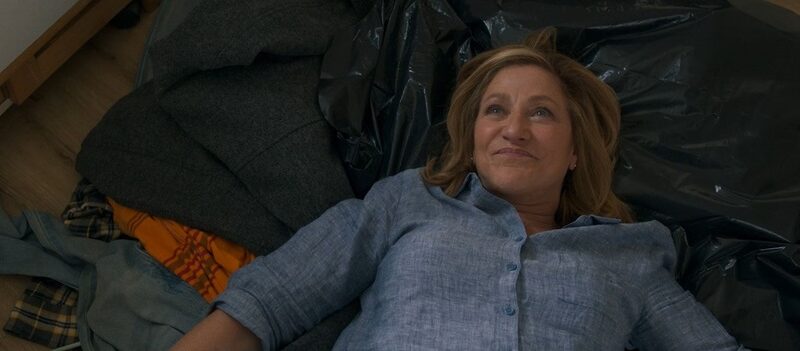I’ll Be Right There (Walsh, 2024)
Three is a particular style of comedy that I have never much cared for that calls on us to laugh at (or with, but usually at) a put-upon protagonist. When an exasperated normal person is stuck in the middle of a group of crazy (literally or figurative) people or caught in a web of crazy situations, it can be mildly amusing if the audience smiles with wry recognition. But such situations can also evoke irritation or memories of it. For every Mary Tyler Moore Show where the satirical stereotypes are more Horatian than Juvenaliam and the damage inflicted by the cartoonishly selfish and obtuse is small enough to be shrugged off, there are dozens of “The Overcoat,”s What About Bob?s, or Seinfelds where their quirkiness is less endearing than grating.
I’ll Be Right There features Edie Falco as Wanda, in a classic only-adult-in-a-movie-full-of-babies situation. Her husband left her to start family 2.0, Her current boyfriend is so supportive she feels guilty about lying to him and taking a lesbian lover. Her girlfriend cares only about the mystical qualities of the sex and not about the person she is having it with. Her pregnant daughter trashes her because her ex-husband won’t pay his half of the fees for a big wedding. Her mom won’t shut up long enough to let the doctor give test results. Her son rips into her on the car ride home from jail after Wanda has bailed him out.
Any one of these threads might be enough to establish or develop the central conflict about a woman trying to live in a society where selflessness is simultaneously expected and denigrated. Woven together, they form an oversized straightjacket that muffles any laughs under layers of co-dependent enabling. One knows one is in trouble in these sorts of movies when one finds oneself siding with the ex-spouse (in this case, the superb Bradley Whitford), or at least nodding in agreement as he defends himself from her attacks by suggesting that maybe she wouldn’t have to do everything for everyone if she didn’t drop everything and come running every time her phone rings.
Since I mention Whitford by name, I should probably clarify here that my irritation is at Wanda, not the actress who plays her. Falco is an undeniable talent even if I think she is saddled here with a script that doesn’t allow her to show much range. Her endearing persona keeps the film floating along just this side of Fresh until the last act inexplicably has Wanda do a 180 on the small boundaries she has learned and enforced and give her newest friend a speech that I have a hard time interpreting any other way than that she is saying it is her God-given right to be a doormat if she wants to be, and anyone who does not like it can burn her bra when the grab it from her cold, dead, fingers. Do I paraphrase? I do. But that’s the message I got.
There is an irony in my last paragraph that does not escape me in that I am a male film critic now on record as criticizing a female character for voicing her insistence that subordinating her wishes and desires to those of her children is an honorable thing. I do think there are reminders to be made that empowering women means empowering them to make their own choices, not yours. But I would be more sympathetic here if the Romantic Comedy genre didn’t so regularly and empathetically punish working female characters. Literature and film are full of poignant stories of meek women who learn to stand up for themselves without becoming shrews or harpies. (Mansfield Park and Jane Eyre are two of my favorites.) It is also full of stories of female characters who find meaning in lives of service to others, especially their children. (Caroline Ingalls, Isabel Archer, Marmee March, and Sue Brierly are some that come to mind.) It isn’t so much a problem for me what Wanda actually chooses than that I’ll Be Right There never appears to see her dedication to others as an actual choice born out of her own values but rather as some biological or cultural hardwiring that never gets seriously examined or interrogated.

